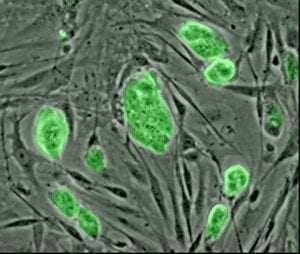 Diabetes Cure: Adult Stem Cells or Embryonic Stem Cells: A cure for type 1 diabetes has long been thought to eventually come from the replacement of the beta cells within the pancreas that produce insulin, a hormone that is necessary for life. These beta cells are contained with the Islets of Langerhans in the pancreas, and their job is to make and release insulin and control the level of glucose in the blood. There has been much controversy surrounding the use of embryonic stem cells (cells that are derived from an early-stage embryo) from a moral and ethical point. In some instances, the mere mention of stem cells taken from an embryo can cause an uproar in regards to abortions.
Diabetes Cure: Adult Stem Cells or Embryonic Stem Cells: A cure for type 1 diabetes has long been thought to eventually come from the replacement of the beta cells within the pancreas that produce insulin, a hormone that is necessary for life. These beta cells are contained with the Islets of Langerhans in the pancreas, and their job is to make and release insulin and control the level of glucose in the blood. There has been much controversy surrounding the use of embryonic stem cells (cells that are derived from an early-stage embryo) from a moral and ethical point. In some instances, the mere mention of stem cells taken from an embryo can cause an uproar in regards to abortions.
Embryonic stem cells are easy to grow in the lab, but these embryonic stem cells are difficult to turn into pancreatic beta cells that produce the needed insulin.
Embryonic stem cells are pluripotent cells and can generate all cell types in the body, whereas adult stem cells are multipotent cells and can only produce a limited number of cell types.
Professor Shimon Efrat of the Tel Aviv University, Department of Human Molecular Genetics and Biochemistry at the Sackler Faculty of Medicine, has done a study with the adult pluripotent stem cells. These adult-derived stem cells could pave the way for new treatment in diabetes, states Professor Efrat. Professor Efrat added that, “these induced pluripotent stem cells represent an embryonic-life state. To some degree, he found, the cells retain a ‘memory’ of what they once were – when created from pancreatic beta cells, the cells responsible for the production of insulin, these pluripotent cells prove more efficient than their embryonic counterparts in creating insulin-producing cells.” Professor Efrat stated, “This discovery promises to advance the development of cell replacement therapy for diabetics, possibly leading to an effective alternative to organ transplants.” He further stated that, “When generated from human beta cells, pluripotent stem cells, these memory cells act as though they are receiving a prompt from their past life; the cells already have some understanding of their purpose, making them more efficient in generating beta cells.”
There are 3 million Americans with type 1 diabetes. For a cure to type 1 diabetes (a condition difficult to control on a day-to-day basis and that many times results in subsequent severe complications) some people have opted from an organ transplant to replace those insulin-producing cells. Like with any organ transplant, it is a difficult road to maneuver – a long wait list and a shortage of organ donors. This process can take many years. Professor Efrat noted, “The ratio of donors to potential recipients is about one to 1,000. A better option is sorely needed, and stem cells present a viable hope for the future.”
Professor Efrat did his study with a Ph.D. student, Holgen Russ, and in collaboration with Professor Nissim Benvenisty and Ori Bar-Nur from the Hebrew University, and the results were recently published in the journal Cell Stem Cell. “This discovery that was made by Professor Efrat and his fellow researchers was licensed to a start-up company that promotes the research and development of technology of innovative treatments for diabetes.”